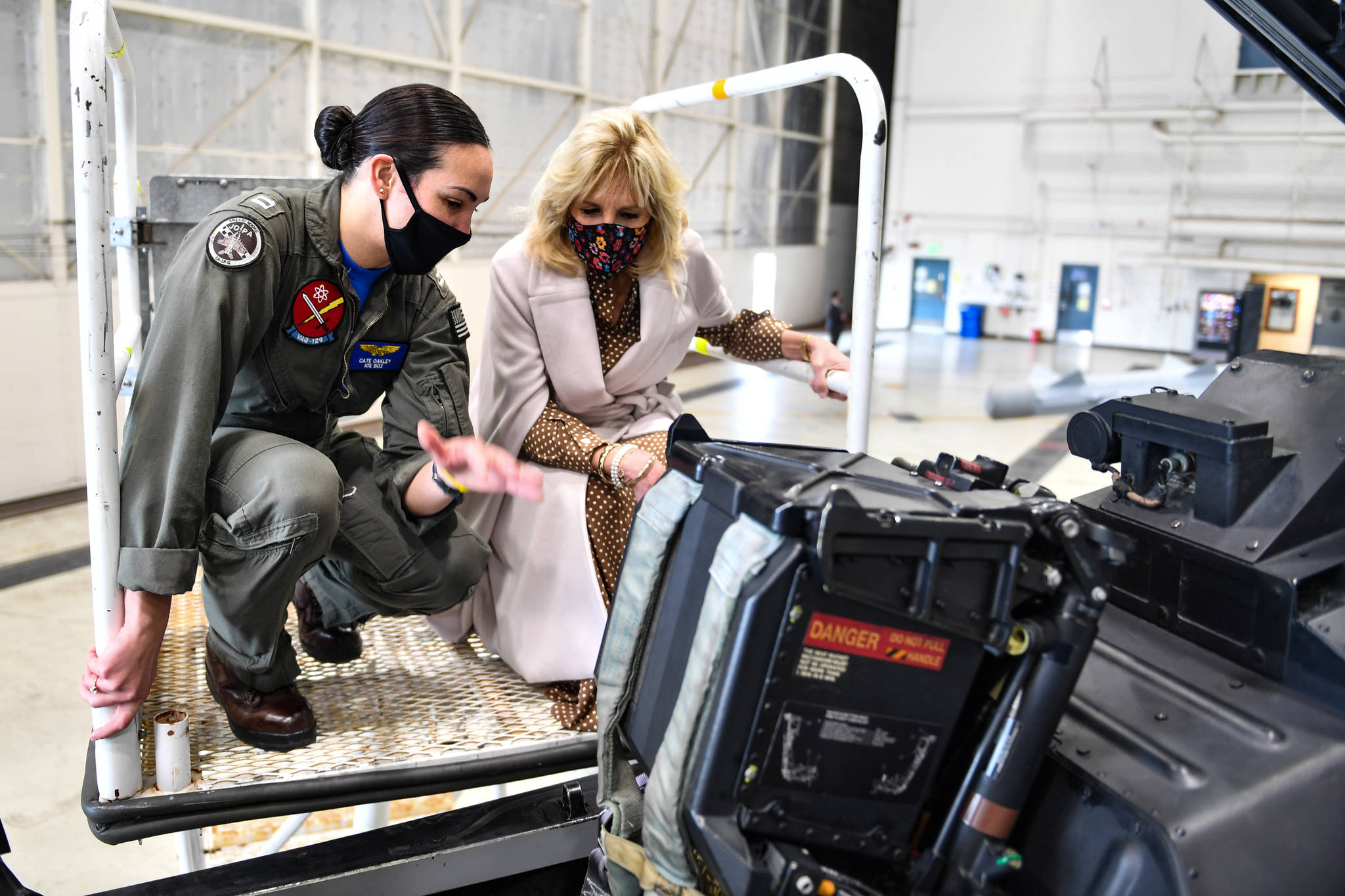Oak Harbor military spouses shared their concerns about health care, employment opportunities and more with first lady Dr. Jill Biden during her visit to Naval Air Station Whidbey Island on Tuesday.
Prior to this more informal discussion, the first lady acknowledged the challenges facing military spouses during her brief remarks in a conference room.
“Choosing to serve your nation as a member of the armed forces, or the families who serve alongside of them, should be a pathway to opportunity,” she said. “But we know that too often this community faces roadblocks along the way.”
The first lady then introduced the Joining Forces initiative she and former first lady Michelle Obama launched in 2011. Her listening tour of three West Coast military installations this past week was ahead of her plans to relaunch the effort.
Joining Forces is a “nationwide initiative to support our service members, veterans, families, caregivers and survivors,” she said.
It emphasizes employment, education and wellness opportunities for the military community, especially service members’ families, she explained.
“This is what all Americans need to know — that they move, again and again, they change careers and schools so that their loved ones can keep us safe,” Biden said of military families.
“They know that life comes with challenges, but it shouldn’t be harder than it needs to be, so your commander-in-chief, my husband, and I will continue to lift up your experience and rally the support that you deserve.”
Her reason for visiting, she said, was to listen to their concerns and how better the nation can support them.
“We want to know what challenges you face, what’s getting in your way, and just as importantly, we want to know what’s working at places like Whidbey.”
The first lady did not take questions from the press, and journalists were escorted out of the room.
Samar Arny, wife of base commanding officer Capt. Matthew Arny, said some of the local concerns shared centered on mental health, lack of health care providers, education and child care challenges, issues faced by families with special needs children, barriers to employment and underemployment, challenges faced by LGBT families, housing problems and hardships created by the pandemic.
The group also suggested specific policy changes, such as hiring more health care and mental health care professionals to address waitlist times, but Arny said she did not want to delve into specifics.
Personally, Arny spoke to Biden about empowering spouses from within and the unique challenges for families on a remote base like NAS Whidbey.
“If the spouse is not empowered deep within, the kids are not happy, the active duty member is not happy, and then the whole cycle will affect the whole performance of the service member,” she explained.
Although not all of the local spouses were able to meet with Biden, Arny said she wanted them to share their concerns, so she made a booklet for the first lady. She received about 100 responses.
One section included people’s entrepreneurial endeavors, one was about their challenges and recommendations for the first lady, and the last included testimonies about previous empowerment initiatives on the base. Some spouses also included examples of their work.
“I wanted to shine the light on what spouses can do on Whidbey Island,” Arny said.
Specifically in regards to employment barriers, Sarah Hogue, a work and family life consultant and former Navy ombudsman, said the island’s remoteness is an obstacle. Her husband is an aviation ordnanceman.
“We live on an island, and employment here is hard to come by; there are not major corporations here,” Hogue said.
She echoed Arny’s summary of concerns, adding that “COVID-19 extrapolated many of the issues that were already here.”
Alisha Baneck said that she spoke with the first lady about the lack of health care providers on the island and how it impacted her family.
Baneck’s husband is an aviation electrician who enlisted more than a decade ago, and their family has been living in Oak Harbor since 2015.
Her two sons are on the autism spectrum and need applied behavioral analysis therapy, but getting them in to see a provider is difficult, she said.
“I don’t really have a choice of who I can go to,” Baneck said of the lack of local providers.
Long waitlists are also an issue once she finds someone for her son to see.
Baneck suggested that there is not an incentive for providers to work with Tricare, the military’s insurance provider, because of the sheer amount of paperwork required.
“Tricare demands a lot from their providers, but I feel like if there were some sort of incentive for providers to work with Tricare it might help with the burden of the long waitlists,” she explained.
She said she felt like Biden was receptive to her concerns.
“It’s really refreshing,” she said, “to have somebody who genuinely cares and wants to do something about it, finding solutions to help us.”



